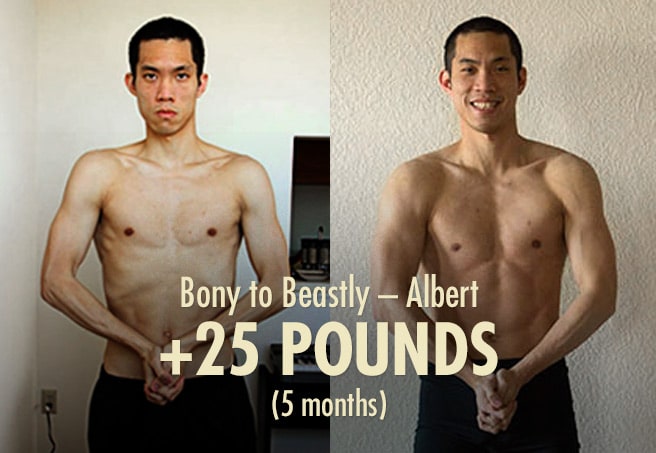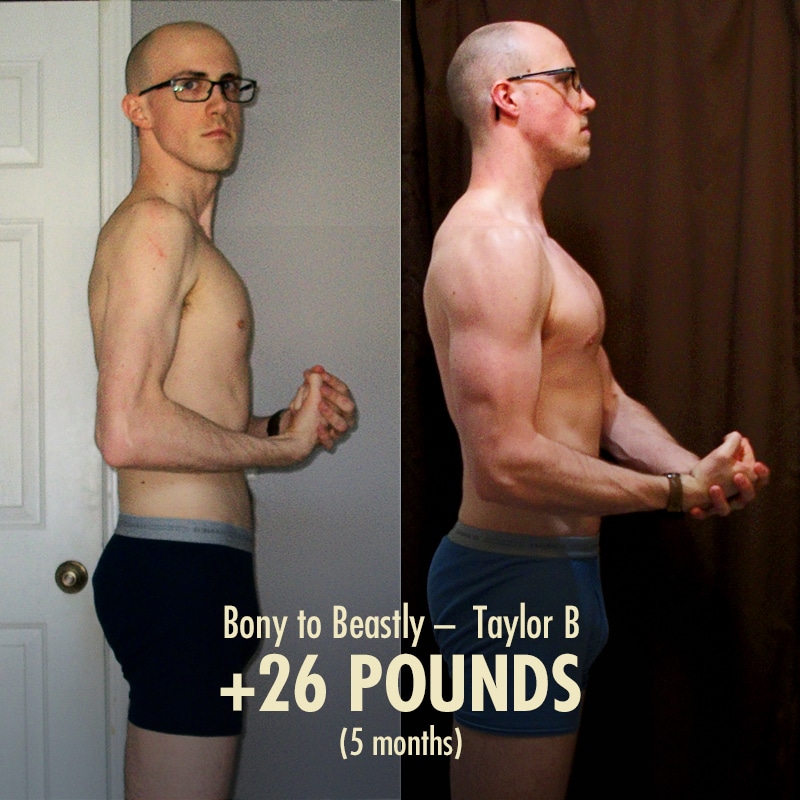
How to Eat More Calories, Increase Your Appetite & Gain Weight
Most naturally thin people struggle to eat enough calories to gain weight. Usually, that’s a good thing. Our genetics help us avoid the obesity that plagues almost everyone else.
But if you’re skinny, underweight, or trying to bulk up, then the same genetic advantages that keep you healthfully lean can also make it extremely difficult to eat enough calories to build muscle.
Gaining weight is difficult, but it isn’t impossible, and we can make it much easier. I’ve gained 70 pounds and comfortably maintained it for over a decade. We’ve also helped over fifteen thousand other naturally skinny people bulk up, including professional and Olympic athletes. We’ve learned quite a lot while doing it.
I’ve got 17 tips that will make it much easier to gain weight.
- Why is it Hard to Eat Enough?
- Stimulate More Muscle Growth
- The Junk Food Problem
- The Fibre Problem
- The Water Problem
- Coffee & Tea
- Chewing, Grinding & Blending
- Eat Faster
- Eat More Often
- Eat More Carbs
- Eat More Fat
- Eat More Protein
- Homemade Weight-Gainer Shakes
- Bulking Sauces & Dips
- Meal Schedule
- Grocery Shopping
- Meal Planning & Meal Prep
- If You Have to Eat a Big Meal
- High-Calorie Backup Meals
- Weird Bulking Diets
- Progressive Caloric Overload
- Free Bulking Recipes
- Full Bulking Guide
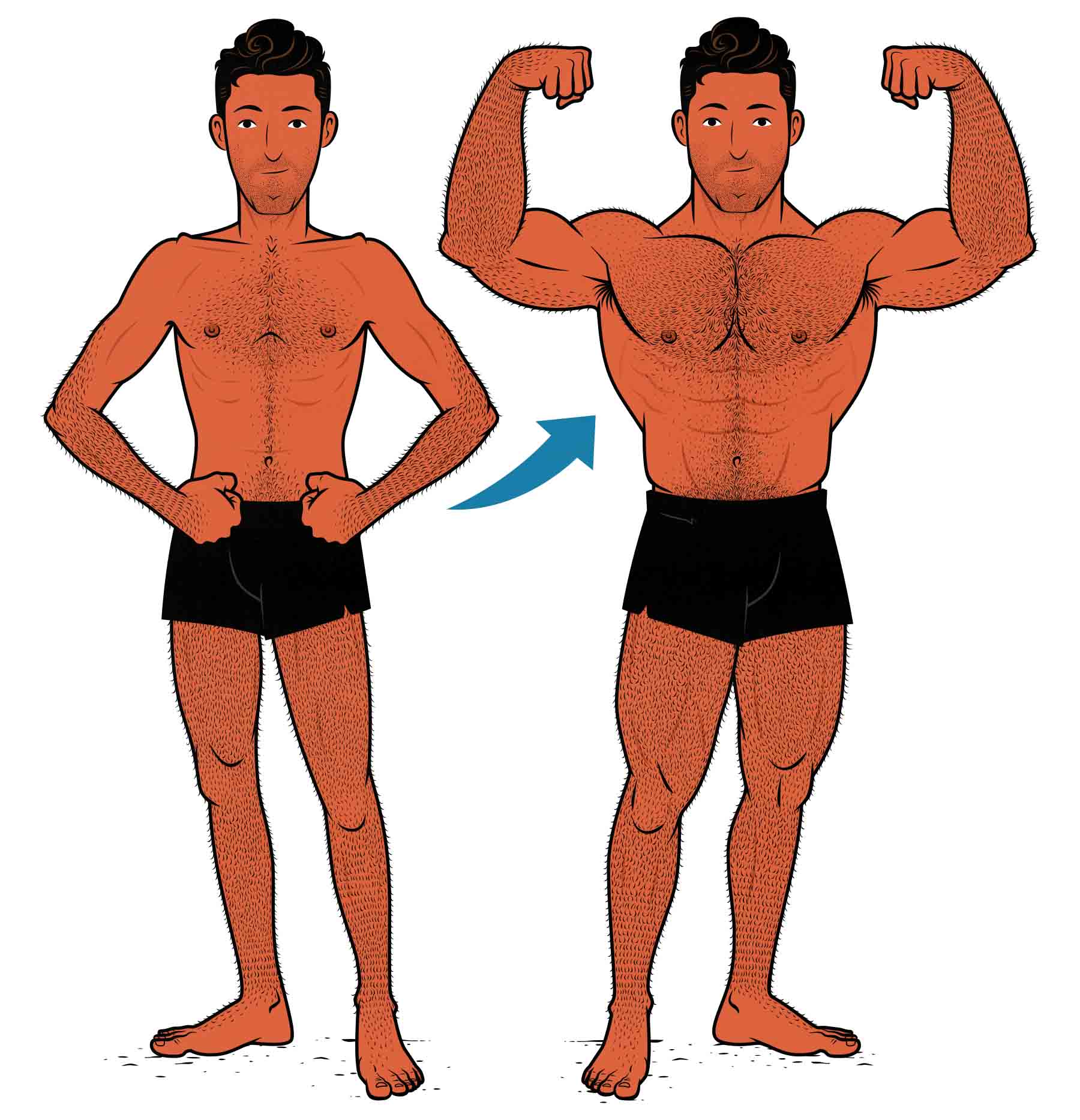
Why is it Hard to Eat Enough?
Naturally thin people usually have a hard time gaining weight because of some combination of an adaptive metabolism, a meagre appetite, and a small stomach.
An Adaptive Metabolism
An adaptive metabolism is one that adjusts to your calorie intake. When you eat more calories, your metabolism burns more calories, cancelling out the calorie surplus.
The main way we burn those extra calories is by subconsciously moving more. The extra activity can be as subtle as spending more time sitting upright instead of slouching. You probably won’t notice it. I wrote up a deeper explanation here.
You can still get into a calorie surplus, but you might need to eat more extra calories than expected. It takes about 800 extra calories to gain a pound of muscle, so you might think that 100–150 extra calories per day would be enough to gain a pound per week. In practice, though, skinny people usually need more like 300–500 extra calories.
A Meagre Appetite
The next issue is a meagre appetite. Appetite is complicated, but here’s a common example: most naturally thin people have fewer fat cells, meaning that fewer fat cells are calling out to be fed (study). That makes it far more comfortable to stay thin.
There’s no downside to that. Having fewer fat cells doesn’t hinder muscle growth. It just makes it easier to stay lean, helping you gain less fat while bulking. Even better, once you’re an adult, the number of fat cells you have doesn’t change. They just shrink and expand. You’ll keep your leanness advantage forever.
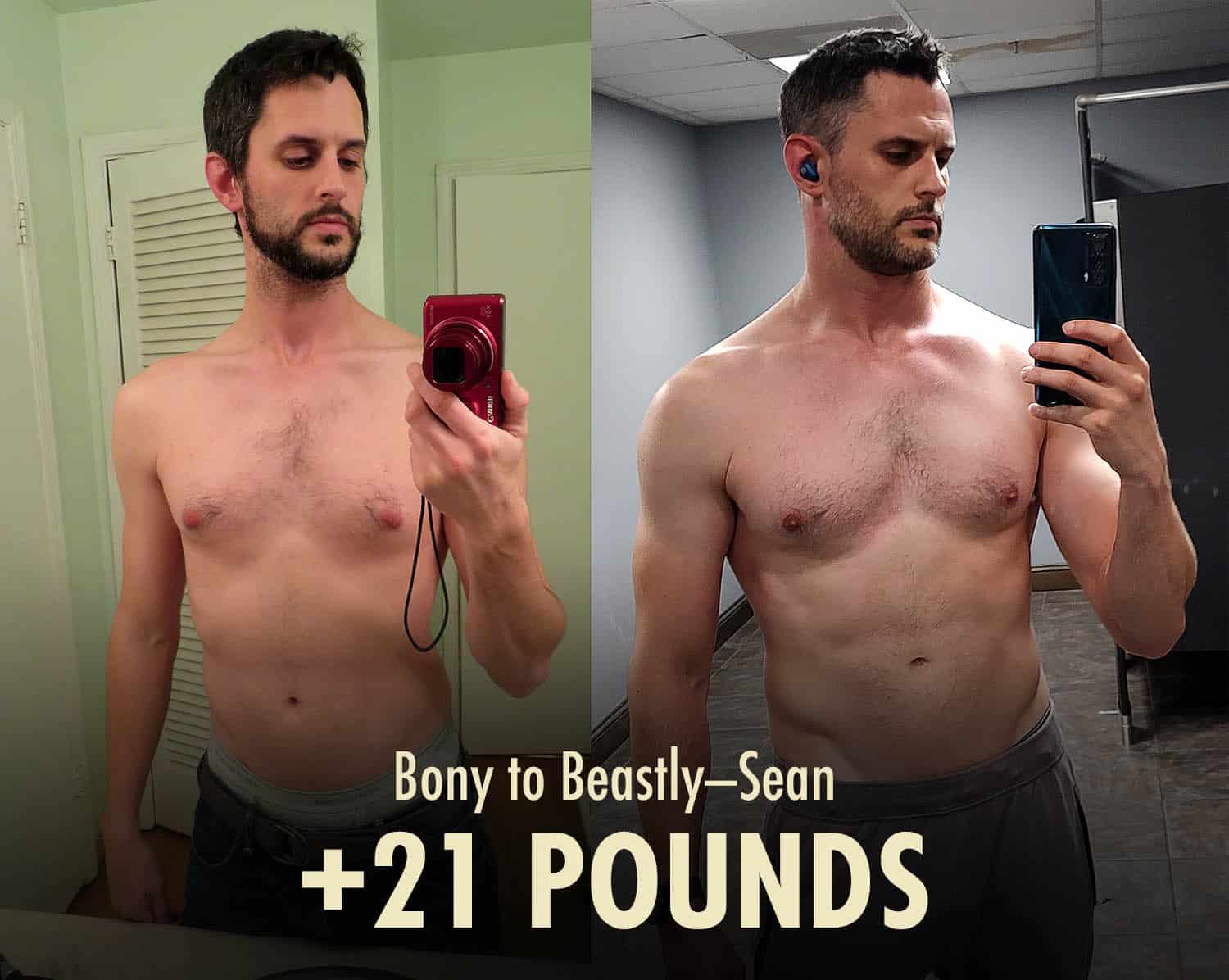
You might also get fewer pleasure hormones from eating, making eating less enjoyable. That also makes food less soothing, meaning you might be less tempted to eat when sad or stressed.
Stomach Size
In a famous 1945 study, AJ Cox found that the size of the human stomach can vary by up to 600% between people. In fact, according to Cunningham’s Textbook of Anatomy, “No organ in the body varies more in size than the stomach.”
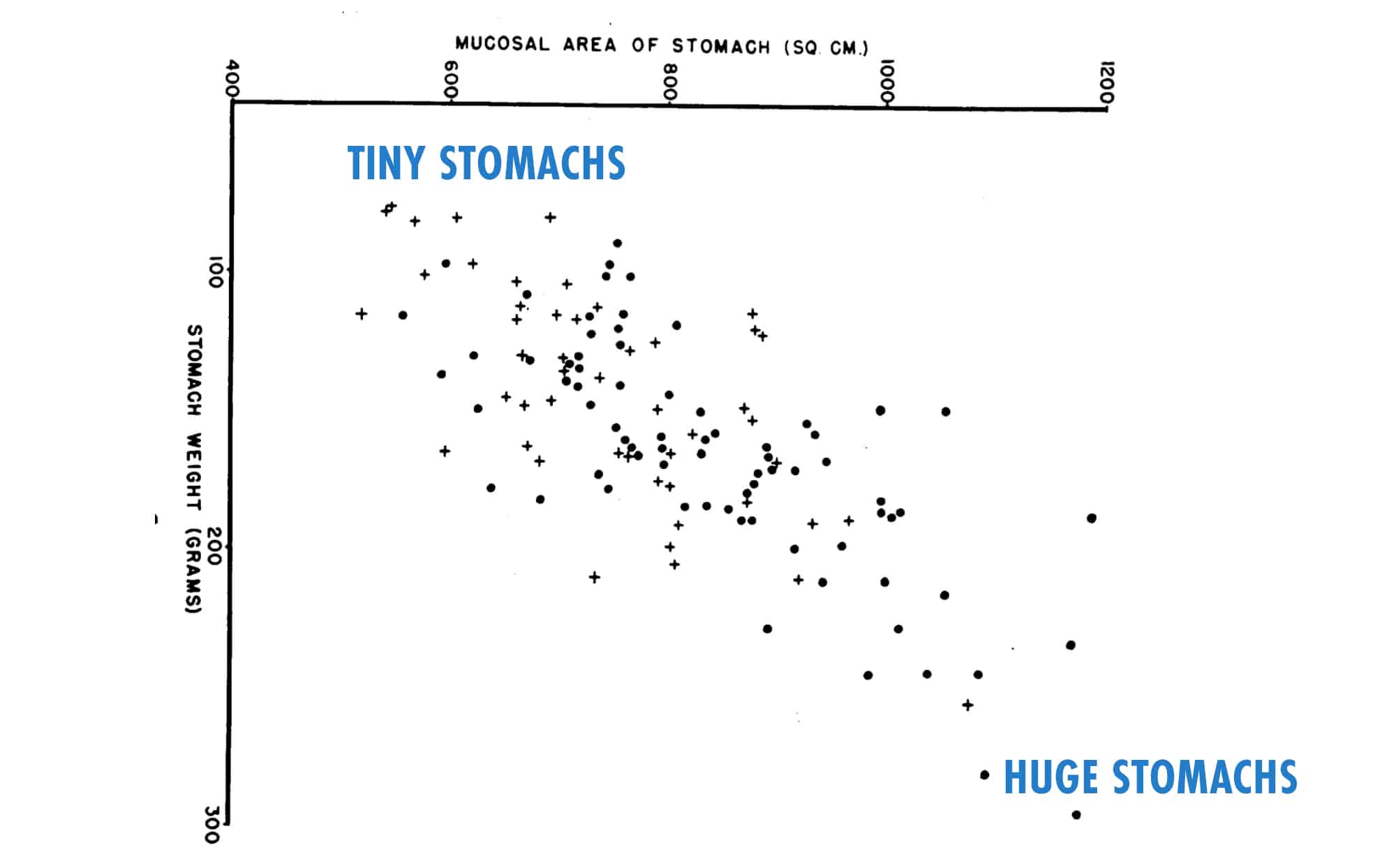
That means the person saying you just need to eat more food might have a stomach six times bigger than yours. That can make it absolutely effortless for them to gain weight, making it hard to understand why it’s so difficult for us.
But just because it’s difficult doesn’t make it impossible, and there are actually quite a few ways to make it easier.
Stimulate More Muscle Growth
The very first step is to stimulate as much muscle growth as you possibly can. If you start eating more food before you start lifting weights, then almost all of the weight you gain will be fat.
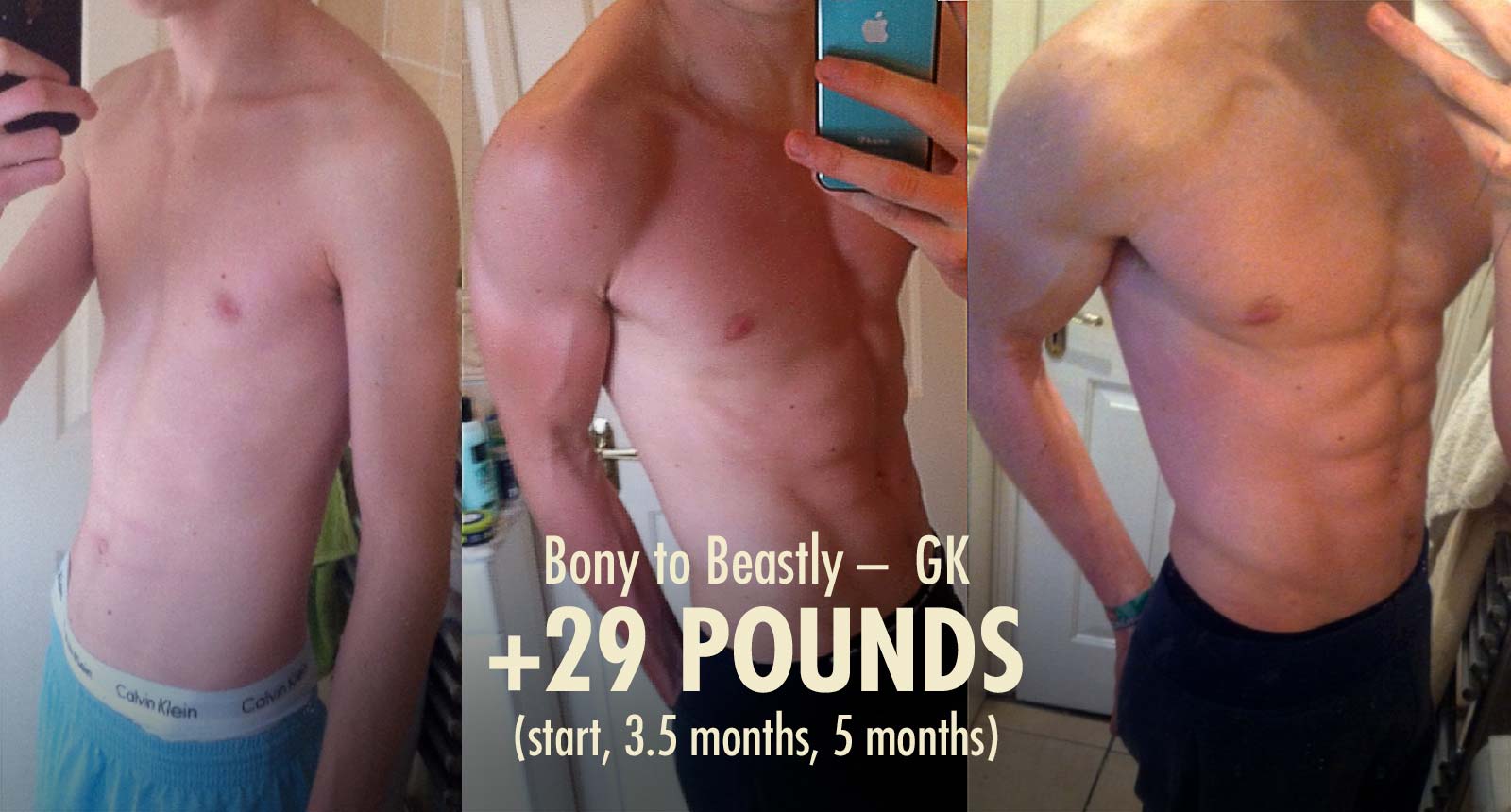
If you’re naturally thin, then your body probably isn’t very interested in gaining fat, which can make it even more difficult to gain weight, and you probably wouldn’t want to gain that kind of weight, anyway.
Some people find that stimulating their muscles also stimulates their appetites, but that isn’t always true for skinny guys. In my case, working out makes me want to eat enough to maintain the muscle I’ve already gained, but it’s never helped me gain weight, even when I was 120 pounds, with a BMI of 16.
Most of us need more powerful methods.
The Junk Food Problem
The most famous appetite study is The Satiety Index of Common Foods (study). The researchers took a bunch of common foods and measured how full people felt after eating them:
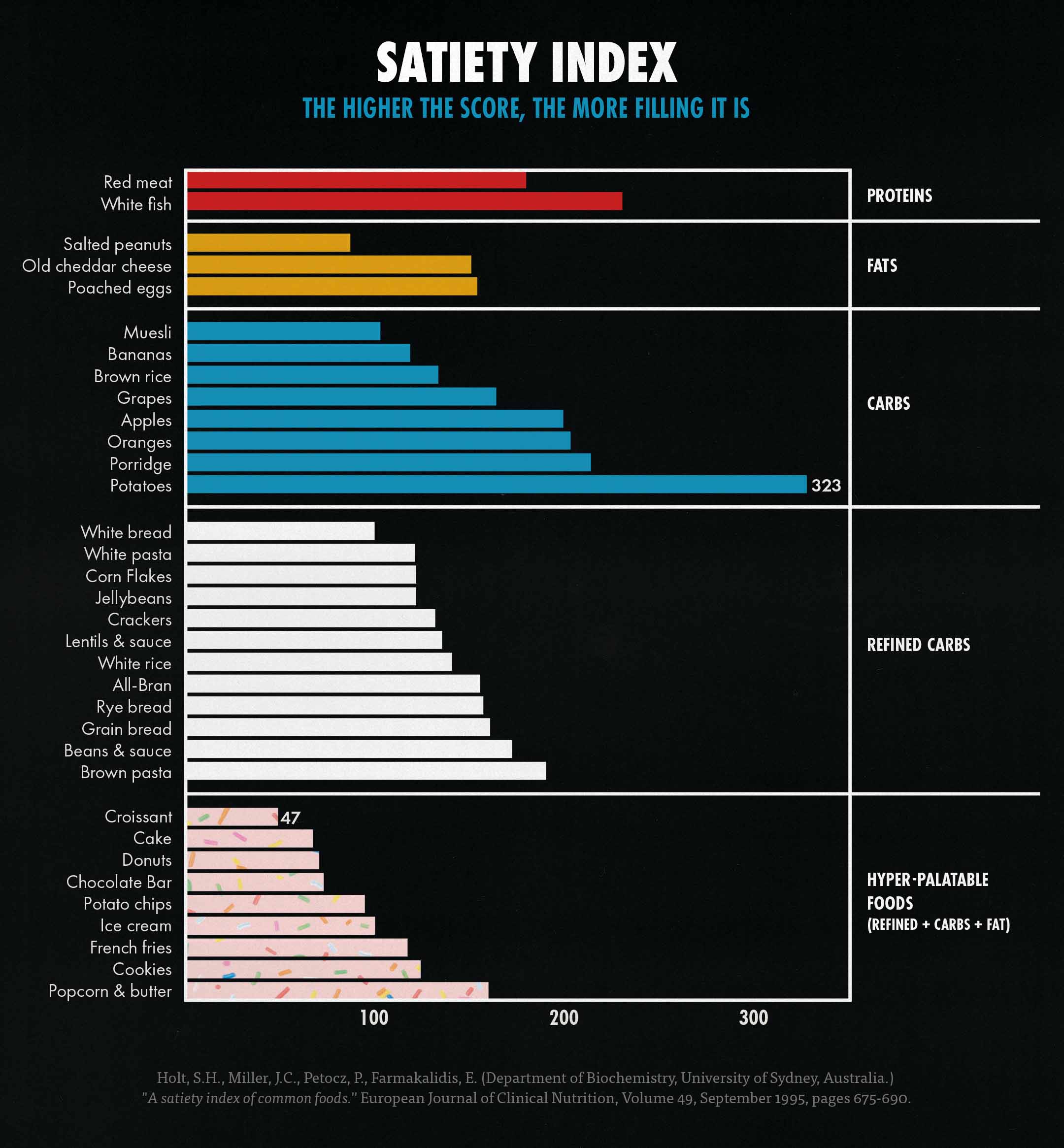
The researchers found that boiled potatoes, white fish, and oatmeal were the most filling, whereas croissants, cake, and donuts were the least filling. No great surprise there, though it might seem a little weird how filling boiled potatoes are. I’ll explain that in a minute.
What makes this study special is that the researchers measured how many calories people ate in their next meals. They found that the less filling a meal is, the more calories you’ll eat later in the day.
For example, if you ate a boiled potato for lunch (323 satiety), you might eat 650 calories for dinner, whereas if you ate a croissant for lunch (47 satiety), you might eat 800 calories for dinner. That’s a difference of 150 calories. That might be enough to tip you into a lean bulk.
The problem is that the foods that make it the easiest to gain weight are all junk food. The foods with more protein, fibre, vitamins, and minerals in them are far more filling, making it harder to gain weight.
That’s why “dirty bulking” is so popular, where you bulk up by eating large amounts of junk food. That isn’t the best way to build muscle, though, especially if you want to build muscle in a lean and healthy way. So, let’s look at better methods.
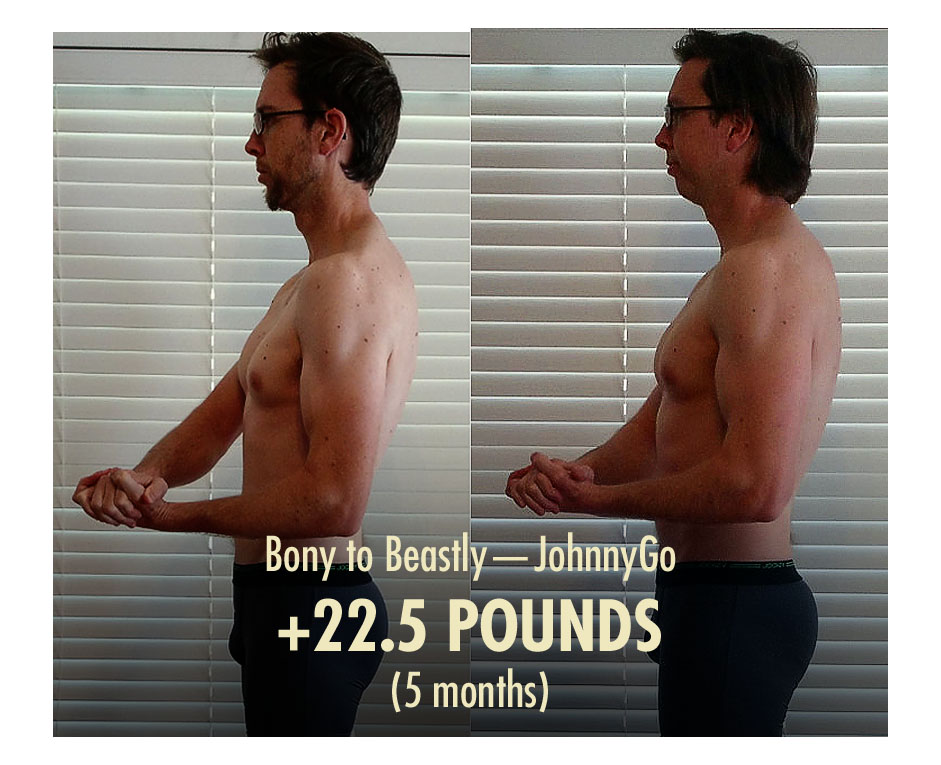
The Fibre Problem
Fibre only has about 2 calories per gram, which is only half as much as regular carbs. That means that if you fill up your stomach with fibrous carbs (like celery), you’ll only get around half as many calories as if you had starchy carbs (like peas).
Fibre also slows digestion and keeps us feeling full for longer. That’s a problem because fibre also improves your blood sugar and blood lipids, helps food move through your digestive system, and strengthens your gut microbiome.
That means fibre is filling, making it harder to gain weight, but it also builds a stronger digestive system in the long run, making it easier to digest more food.
So, we recommend choosing foods that are high in fibre and starchy carbs. There are quite a few of them:
- Whole grains: oats, corn, whole-grain bread, brown rice
- Veggies: potatoes, sweet potatoes, and peas
- Fruits: apples, mangoes, and blueberries
- Legumes: beans and lentils
The Water Problem
Water doesn’t contain any calories. That means the more watery a food is, the fewer calories it has and the more room it takes up in your stomach. That’s why boiled potatoes are so infuriatingly filling. Same thing with other watery fruits and vegetables like strawberries, watermelons, apples, pears, broccoli, pickles, and carrots.
Broccoli vs peas:
- 1 cup broccoli: 55 calories, 6 grams protein
- 1 cup peas: 125 calories, 9 grams protein
Strawberries vs blueberries:
- 1 cup strawberries: 50 calories
- 1 cup blueberries: 85 calories
Bananas vs apples:
- 1 cup sliced apple: 60 calories
- 1 cup sliced banana: 135 calories
The best bulking meals tend to have a moderate amount of fluid. Having a moderate amount of fluid helps you digest food. Think of the chankonabe stew that sumo wrestlers eat, muesli cereal with milk, a high-calorie smoothie, or my personal favourite: chilli. The fluid makes them easy to digest, but they’re also high in calories, allowing you to comfortably fit more calories into your stomach.
If you like drinking a glass of water with meals, that’s fine. But you could bump your calories higher by swapping water for milk, soy milk, oat milk, or even fruit juice. They contain the fluid you need and are richer in calories and protein.
You can also drink as much water as you want between meals. When you drink water on an empty stomach, it passes through your stomach fast. Most of it will be gone within 10 or 20 minutes.
Coffee & Tea
Coffee and tea don’t contain any calories, and they’re full of water, so it might make more sense to have them between meals instead of with meals.
What’s interesting is that coffee stimulates the production of stomach acid about 30 or 45 minutes after you drink it, which can improve your ability to digest your next meal (study).
On the other hand, if you have a sensitive digestive system, then too much caffeine might trigger heartburn and acid reflux. (I’ve gotten heartburn a couple of times from drinking coffee right after eating a big meal.)
Chewing, Grinding & Blending
The more you need to chew a food, the longer it takes to eat, and the fuller you’ll feel. That means one of the best things you can do is soak, stew, grind, and blend your food so that it’s easier to chew and faster to eat.
Plus, the more you can break down your food, the easier it is to digest (study). You can break your food down by chewing it thoroughly, but blending and grinding can work just as well—sometimes better.
Ground Meat Meals
That’s why ground beef and ground chicken are such popular bulking foods. They’re way easier to chew than steak and chicken breast, making them much less filling. That gives us three great bulking meals:
- Texan chili (my favourite): ground meat, beans, corn, hot/bell peppers, and cheese.
- Picadillo: ground meat, bell peppers, potatoes, raisins, olives, and capers on a bed of rice.
- Monster Mash (from the Vertical Diet): ground meat, bell peppers, and chicken broth mixed with rice.
High-Calorie Smoothies
Fruits and veggies take a while to chew, too, so you can blend them up with yogurt, nuts, and seeds to make high-calorie bulking smoothies. Most research shows that drinking liquid calories makes it easier to gain weight, but smoothies are usually high in fibre and protein, making them unique (meta-analysis).
When you blend fruits and vegetables, it’s like chewing them very finely. They don’t lose any nutrients, they won’t spike your blood sugar, and they often digest a little bit slower, especially if you’re blending up seeds you wouldn’t normally chew through, like the seeds in berries.
What’s interesting about high-calorie smoothies is that even though they digest very smoothly, they still aren’t very filling. When researchers give people bulking smoothies for breakfast, they tend to eat more calories later in the day:
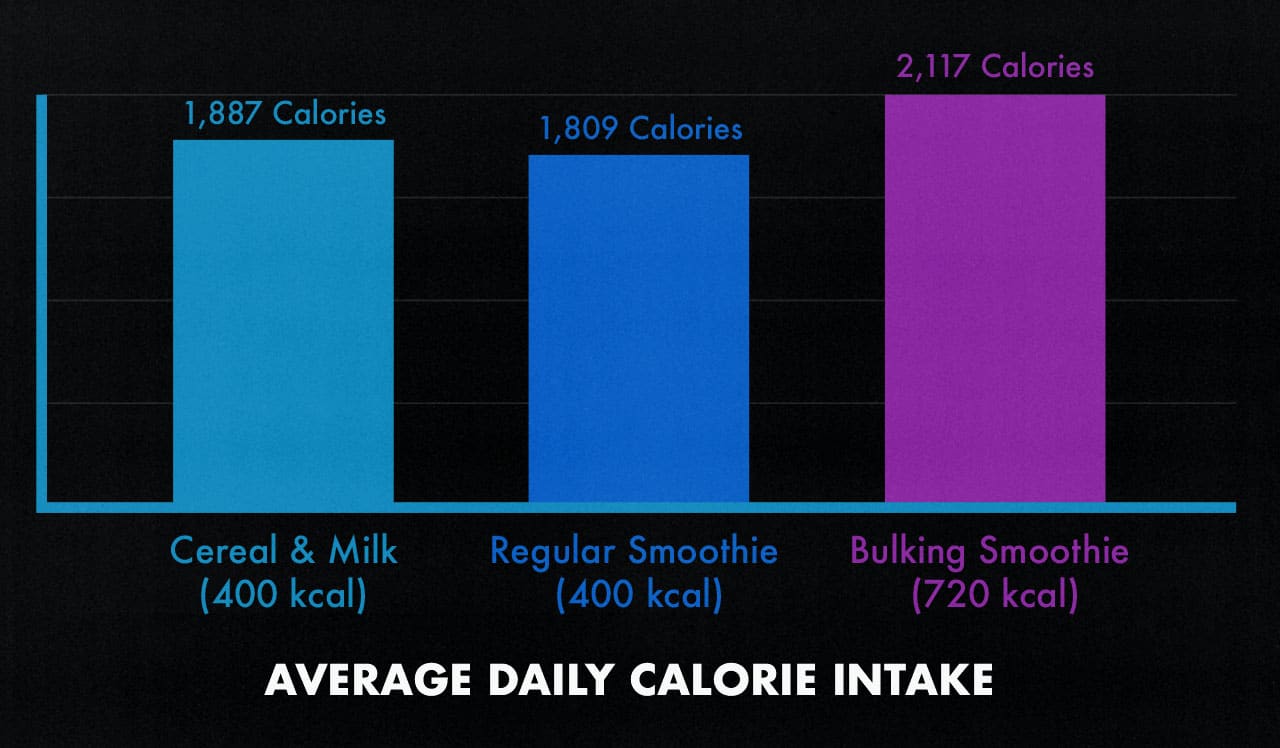
For example, in one study, the participants who swapped their usual breakfast for a 700-calorie smoothie ate an extra 300 calories per day, even though they weren’t trying to (study). That’s enough of a calorie boost to bulk at a pretty good pace. More on how smoothies affect appetite here.
The other benefit of smoothies is that they’re easy to make and drink, and you can pack them with nutritious ingredients. We’ve got two free smoothie recipes here.
Eat Faster
The faster you eat, the more calories you’ll be able to eat before you feel full. It takes a little while for your body to understand that you’ve eaten enough. If you eat fast enough, you can get ahead of your appetite, skipping over that moment in the middle of a meal when you feel too full to keep eating.
This will allow you to eat meals that are a little bit bigger than you would normally eat. That will stretch out your stomach, making it a little bit bigger over time, making it easier to continue bulking.
Your appetite might not fully catch up, either. The research is mixed, but if you can eat more in earlier meals, you should also be able to eat more later (study).
You still need to chew your food properly, but you can take bigger bites, chew them faster, and stop dawdling between bites. Focus on eating until you’ve finished eating.
Eat More Often
If you have a small stomach, it’s hard to eat bigger meals, so try eating more of them. It’s pretty common for bodybuilders to have trouble eating enough calories while bulking, so there’s a long tradition of eating 4–7 times per day. The benefits of eating more often were often exaggerated, but it definitely makes it easier to gain weight.
For example, this study found that if you have a 300-calorie snack after lunch, you’ll only eat 100 fewer calories for dinner. That puts you 200 calories ahead without any extra fullness.
In some fitness circles, intermittent fasting is touted as being a healthier way to eat. However, when you eat fewer meals, it’s harder to overeat (meta-analysis). Most people are overweight, so making it harder for them to gain even more weight improves their health. That seems to explain the entire benefit, and it wouldn’t apply to us.
Easy Bulking Snacks
Eating more often can be as simple as eating extra snacks, and those snacks can be as simple as homemade protein bars, some cottage cheese with jam, or some apple slices dipped in peanut butter.
That might still sound inconvenient, especially if you feel tired after eating. But that energy crash comes after large meals—especially when they’re high in fat, high in sugar, and low in fibre (study, study). If you’re eating more often, you won’t need to eat large meals, preventing energy crashes.
Easy Bulking Breakfasts
I recommend having breakfast pretty soon after waking up. If you’re like me, and you don’t wake up with an appetite, you can keep that first meal light and easy. I’ve got my favourite bulking breakfast recipes here. It can be really simple stuff, though:
- Smoothie
- Muesli cereal with milk
- 2 scoops of protein and a banana
- Peanut butter and jam sandwich with a glass of milk
- Homemade protein bar
What to Eat Before Bed
It might also help to have a small snack before going to bed. Most sleep experts recommend avoiding eating big, high-calorie, high-fat, and high-sugar meals right before bed. It might also help to avoid eating meals that are salty or that have ingredients that can trigger acid reflux (like garlic and tomatoes).
So, think of light meals with protein and complex carbohydrates:
- A cup of cottage cheese with fruit (or a tablespoon of jam)
- Greek yogurt with (frozen) berries and a little bit of honey
- Muesli cereal with milk
- Apple slices with peanut butter
Eat More Carbs
Ketogenic diets are popular for a reason. Cutting back on carbs makes it harder to eat as many calories, making it harder to gain weight. We want the opposite of that—we want more carbs so that it’s easier to gain weight.
The other benefit of eating more carbs is that they pump your muscles full of glycogen, making them fuller and harder, improving your workout performance, and perhaps even increasing your rate of muscle growth (study, study, study). More on the muscle-building benefits of carbs here.
Of all those carbs, rice is the most popular with bodybuilders. Brown rice is a great bulking food, too. It’s chewier, making it more filling, but it also contains more calories, protein, nutrients, and fibre. Both are great, so eat whichever one you prefer (or both).
| Nutrients | White Rice (1 cup, cooked) | Brown Rice (1 cup, cooked) |
|---|---|---|
| Calories | 205 kcal | 215 kcal |
| Carbs | 45 grams | 45 grams |
| Protein | 4 grams | 5 grams |
| Fat | 0 grams | 2 grams |
| Fibre | 1 gram | 4 grams |
Another easy source of carbs is bananas. You can eat them as a snack, slice them into cereal, or blend them into smoothies. If they start to go bad, peel them and stick them in the freezer. Frozen bananas as great for smoothies.
There are plenty of other great carbs: whole-grain bread, beans, lentils, peas, corn, oats, fruits, veggies, yogurt, and milk.
Eat More Fat
Fat has 9 calories per gram, making it over twice as dense as carbs and protein. That makes it easy to fit more calories into your stomach.
Peanut butter is a classic high-calorie bulking food. It’s a healthy type of fat, and it’s also a good source of protein. You can spread it on whole grain bread, blend it into smoothies, dip apple slices into it, or eat it by the spoonful. A heaping spoonful of peanut butter has 150 calories and 6 grams of protein.
Cheese is great, too. I’m not sure if it’s controversial or not, but it’s a traditional, nutritious, well-studied food, and most research shows it has a neutral to positive effect on our health (study). I particularly like melting it on top of my chili.
The most powerful fat is extra virgin olive oil. It’s famous for having healthy polyphenols and being a good source of vitamin E, but it’s also extremely high in calories, with 120 calories per tablespoon. You can drizzle that spoonful on your veggies, mix it into your soups and stews, or add it to your sauces.
Another one of my favourites is dark chocolate, which seems to be good for our hearts, perhaps because it’s another rich source of polyphenols (study). I like to sprinkle dark chocolate chips over a cup of Greek yogurt with frozen berries. The chocolate hardens, giving it a nice crunchy texture that melts in your mouth, making it feel like eating chocolate chip ice cream. If you need even more calories, you can mix in some dried fruits, granola, whole-grain cereal, or muesli.
Eat More Protein
Protein is one of the more important nutrients for building muscle, but it doesn’t take that much to maximize your rate of muscle growth. Only about 0.7–1 gram per pound per day. That target isn’t that hard to hit when you’re trying to eat extra calories. There are grams of protein hiding in almost all the foods we’ve mentioned: ground meat, cheese, yogurt, milk, beans, lentils, peanut butter, nuts, seeds, brown rice, peas, and whole grains.
But you might still need to eat a little bit more than you’re used to. And that can be tough because when you eat protein, your body releases hormones that keep food in your stomach for longer, giving you more time to digest the protein (study).
When food leaves your stomach more slowly, you get a steadier supply of sugar released into your bloodstream. That keeps your blood sugar more stable, which might keep your energy levels more stable (study). But that could also make it harder to eat enough to gain weight.
The research on how protein affects appetite and weight gain is mixed (meta-analysis, study, study, study). Some studies show that eating more protein causes people to eat less, and that effect is stronger with leaner, chewier proteins like chicken breast, white fish, and trimmed steak. Other studies show no effect, and there are plenty of proteins that go down easy:
- Ground beef
- Ground chicken
- Salmon (and other fatty fish)
- Milk (and soy milk)
- Greek yogurt
- Protein shakes
- Bulking smoothies
Homemade Weight-Gainer Shakes
If you have a scoop of protein powder with water, you get about 120 calories and 24 grams of protein. That isn’t bad, but you could add a second scoop of protein, a tablespoon of ground flaxseed, maybe a little beetroot powder, some cacao, or maybe even a scoop or two of maltodextrin (which is a starchy carb, kind of like flour).
Now, your protein shake has up to 500 calories, with 50 grams of protein, some omega-3 fatty acids, 5 grams of fibre, and more vitamins, minerals, and antioxidants. All of these are powders, making it easy to bring the shake to the gym, where you can sip on it while working out.
I drank one of these homemade weight gainers every workout while gaining my first 50 pounds of muscle, and all of my health markers improved. Here’s my second bulk, showing +17 pounds in 4 months while drinking a homemade gainer:
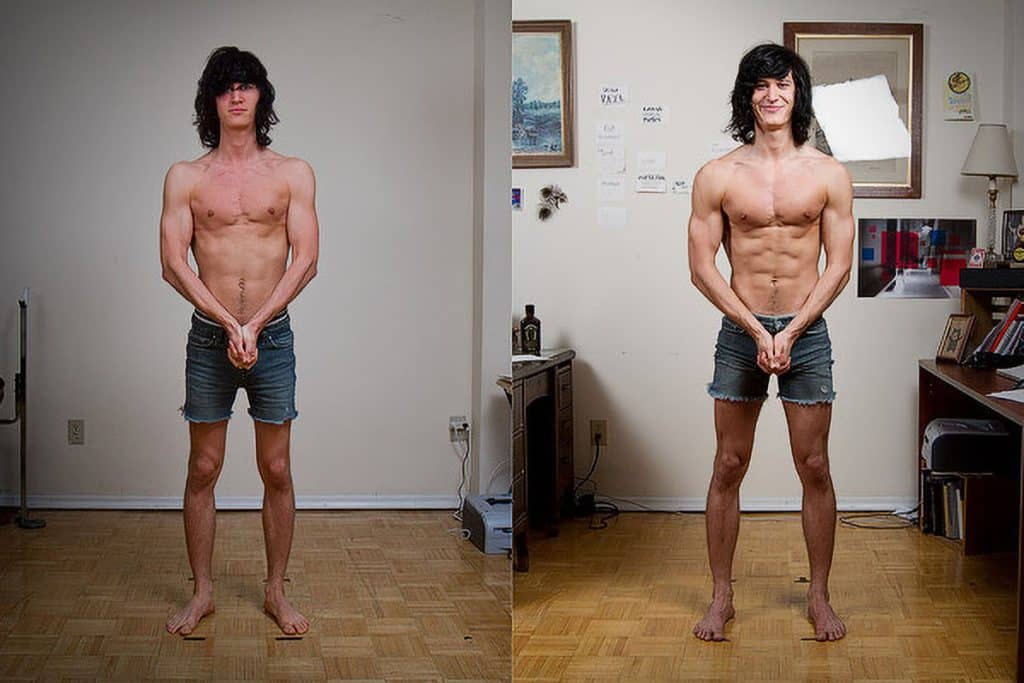
We’ve also used variations of these shakes with hundreds of clients, including college, professional, and Olympic athletes.
Still, some people are wary of protein powders, and even more people fear carb powders. That’s understandable. You can build muscle without powders or supplements.
Other people like using supplements, and that’s also perfectly fine. Some bulking supplements can make it easier to eat more calories, and there’s no reason to think that having reasonable amounts of protein and carb powders would be bad for you. More on that here.
We’ve asked a dozen other nutritionists, dietitians, and hypertrophy researchers about this over the years. They all said it was fine for thin guys who lift weights to use a moderate amount of whey and maltodextrin to help them bulk up.
Bulking Sauces & Dips
Sauces and dips are often packed with calories and nutrients and make your meals easier to eat. Adding jam to a peanut butter sandwich makes it go down way easier. So does adding mole to your chicken breast or a stir fry sauce to your stir fry.
I’m a big fan of “salsa” sauces, such as hot sauce and pico de gallo, but there’s also:
- Soy sauce
- Honey
- Hummus
- Guacamole
- Tahini
- Tzatziki
- Baba ganoush
Many of those sauces are good for you, especially if they have ingredients like olive oil, garlic, ginger, onions, herbs, peppers, tomatoes, or vinegar. Some of those ingredients also seem to help with digestion.
Even sugary sauces like jam, ketchup, and barbecue sauce are fine when they’re a small addition to a big nutritious meal. You don’t need to fear those extra calories when they’re a small part of a good diet that’s helping you build lean muscle.
Meal Schedule
Your digestive system follows your circadian rhythm. Your body prepares hormones, stomach acid, and digestive enzymes at your typical meal times to digest the sorts of meals you normally eat.
It’s much easier to gain weight when you get into a nice steady rhythm, eating similarly sized meals at about the same time every day. Your body will get into the rhythm of it, helping you digest that food.
Eating similar meals at similar times every day also makes it easy to eat about the same number of calories every day. That makes it easy to get into a steady calorie surplus without needing to track your calories. (Though tracking your calories also works, and some calorie-tracking apps are great.)
The problem is that when you’re bulking, you might not feel very hungry very often. So, instead of letting your hunger guide you, pick a schedule and stick with it, eating your meals at predetermined times.
I’m horrible at this. If I’m busy working on something, the last thing I want to do is get up and eat. Normally, that’s totally fine. My muscles won’t fall off. But when I’m bulking, I stick to the schedule, and I grab a smoothie or some Beastly Energy Balls from the fridge.
Grocery Shopping
One of the biggest problems skinny people run into is that when it’s time to eat, they don’t know what they should eat, and they’re too lazy to cook it anyway. So, stock your pantry full of beans, dark chocolate, rice, trail mix, and muesli cereal. Fill your fridge with yogurt, milk, milk alternatives, and leftovers. And keep some frozen mixed berries, salmon, and ground meat in your freezer.
That means if you feel lazy, all you need to do is pour some milk into some muesli, and you have a nutritious 700-calorie meal. Or, if you need to need something you can bring with you, grab some trail mix.
Meal Planning & Meal Prep
I only cooked once per week while gaining my first 50 pounds of muscle. I’d set aside a couple of hours every Sunday afternoon to get groceries. Then, I’d make a dozen servings of chili and a tray of homemade protein bars.
During the week, I’d have one or two bowls of chili, one of those protein bars, a smoothie, and maybe a snack.
If You Have to Eat a Big Meal
Sometimes, in a desperate effort to reach your caloric goals, you’re forced to eat a meal that’s uncomfortably large, leaving you feeling bloated and tired.
When that happens, the temptation is to lie down, which is usually fine, but I find it helps to stand up or go on a walk instead. That seems to speed up digestion, balance out your blood sugar, prevent acid reflux, and clear out any gas that’s building up.
High-Calorie Backup Meals
At some point, no matter how diligent you try to be, you’re bound to fall behind on calories, so you need some high-calorie emergency foods you can fall back on.
I would use shots of olive oil for this. A single shot contains almost 400 calories. I hated taking those shots, but it was either that or losing a day of progress.
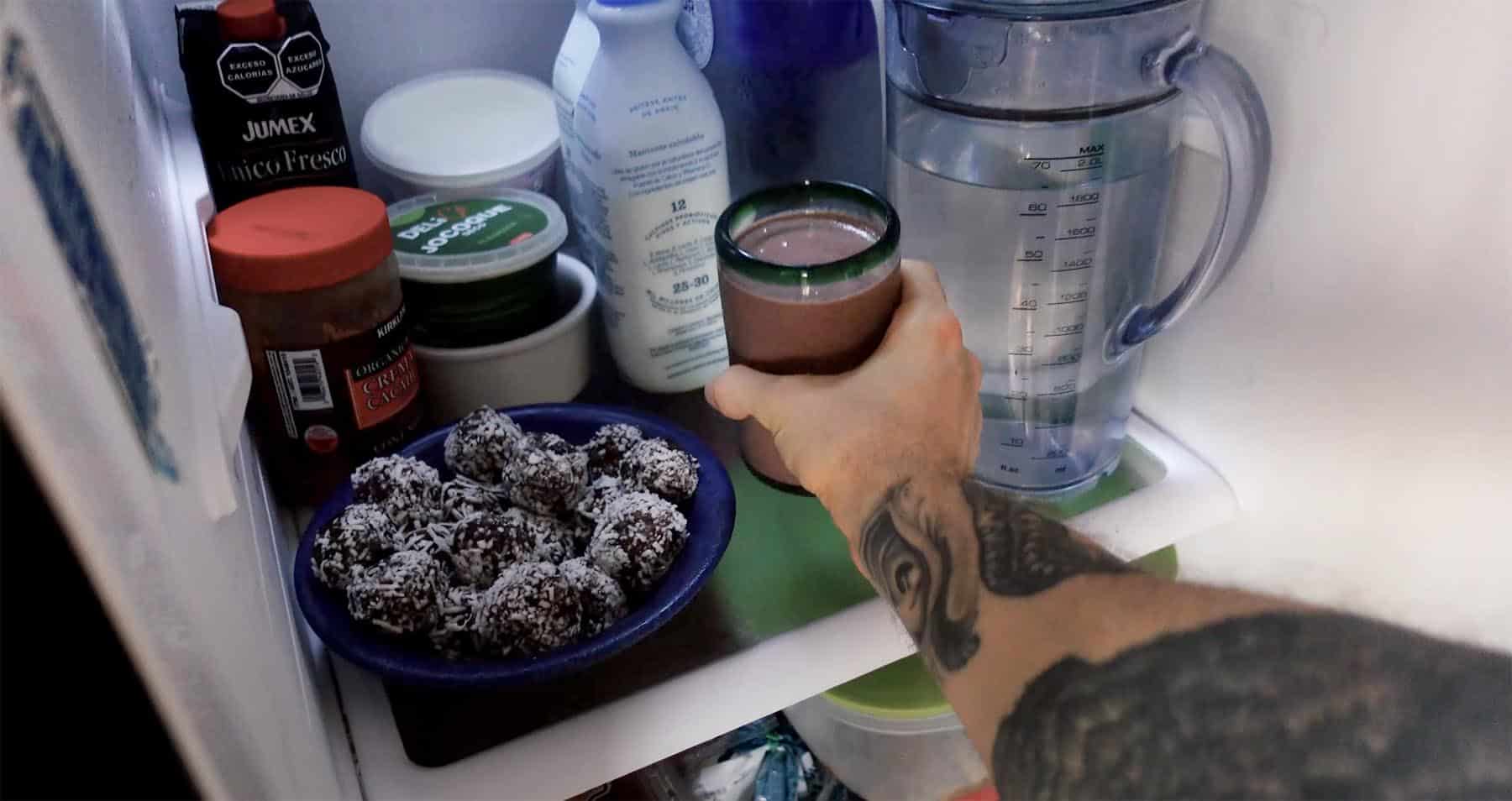
It’s much better to have something more palatable on hand, like these Beastly energy balls. They’re a balanced and nutritious meal, a great source of calories, and far higher in protein. Plus, they only take a few seconds to eat. The trick is to already have them prepared in the fridge.
The other thing I do is eat Greek yogurt out of the tub. It isn’t as high in calories, but it’s very high in protein, and it’s easy to wolf down 8–10 spoonfuls before heading to bed. Muesli cereal is good for that, too.
Weird Bulking Diets
One of the biggest mistakes beginners make is suddenly changing too many things, too dramatically, in too strange of a way. There are three common examples:
- Thousand-calorie smoothies: When I first started bulking, I would pack the blender full of as much healthy food as I could, including unsavoury ingredients like olive oil, raw eggs, and raw broccoli. I would blend up a full litre of that sludge, chug it down, and watch my stomach expand until I looked nine months pregnant, which didn’t feel very good. It’s better to start with a 500 or maybe 700-calorie smoothie. And you want to fill it with normal smoothie ingredients, in normal serving sizings. If that goes well, you can make it a little bigger.
- Weird bulking diets: Another mistake is to switch to a radical diet, like A Gallon Of Milk A Day (GOMAD). Milk can be a great bulking food if you digest it well, but you should have it in normal serving sizes as part of a balanced diet. A Litre A Day (LOMAD) is much more reasonable.
- Weight gainers: Most weight gainers have serving sizes of well over a thousand calories. That’s too large of a serving, and it’s too much processed food. It’s okay to have some protein powder and maltodextrin, but 500–700 calories is enough.
You might get lucky, but most people who bulk in weird and extreme ways wind up feeling bad and gaining fat. Probably not enough fat to cause a problem, but enough fat that you would wish that I would have warned you.
Plus, when you do weird things, you’re more likely to run into weird problems. For example, most foods have small amounts of nutrients that are bad to eat in large quantities. If you start eating 10x the normal amount, you can run into problems nobody would ever think to warn you about.
Progressive Caloric Overload
You don’t need to use all of these tips. Your calorie surplus doesn’t need to be that big. If you can add a 500-calorie smoothie on top of what you’re already eating, that might be enough to get the scale moving in the right direction. Or you could have a small glass of milk or soy milk with meals, snack on a few energy balls between lunch and dinner, or make your meals a little bigger and try to eat them a little faster.
So, at long last, the final tip is to start small and build from there, progressively overloading your calories, just like you progressively overload the weights in the gym. Your digestive system prefers more gradual changes anyway.
Free Bulking Recipes
I mentioned a few recipes in this article, including our Beastly Energy Balls and bulking smoothies. I’ve got those recipes here, free:
get our bulking recipes—smoothies, snack, & protein balls
4 free bulking recipes
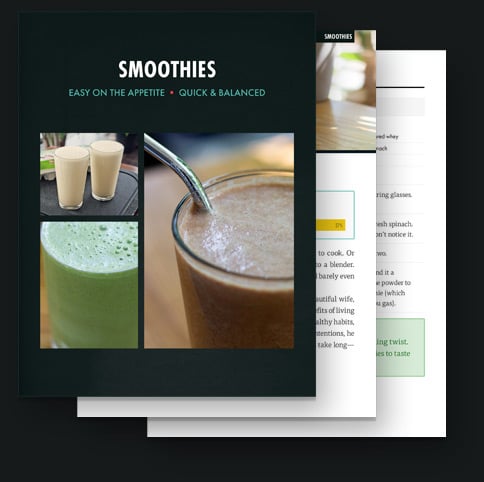
Get four bulking recipes in a downloadable PDF file. Get the full explanation, ingredient list, macros, and steps to follow.
Plus, we’ll make sure you’re on the b2B newsletter, and send you all of our best muscle-building content.
Full Bulking Guide
If you want us to walk you through the entire bulking process, check out our Bony to Beastly (men’s) program or Bony to Bombshell (women’s) program. They include a 5-month workout routine, a bulking diet plan, a recipe book full of meals that make it easier to gain weight, and coaching from us in our online community:
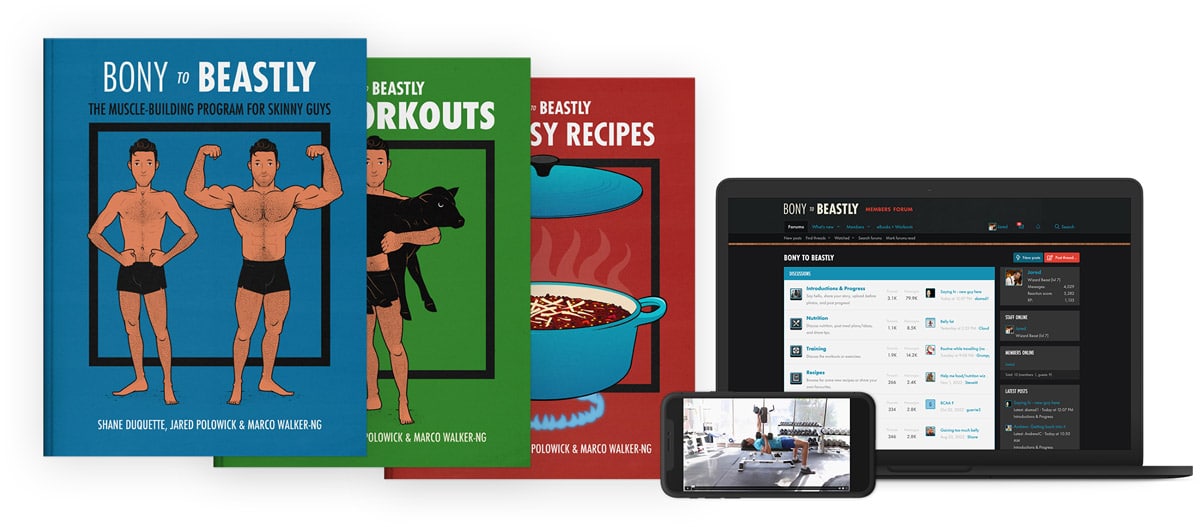
That means we can look at your diet and give you personal advice about how to improve it. We’ll also review your progress as you go through the program, helping you get faster, leaner, and more consistent muscle growth.

